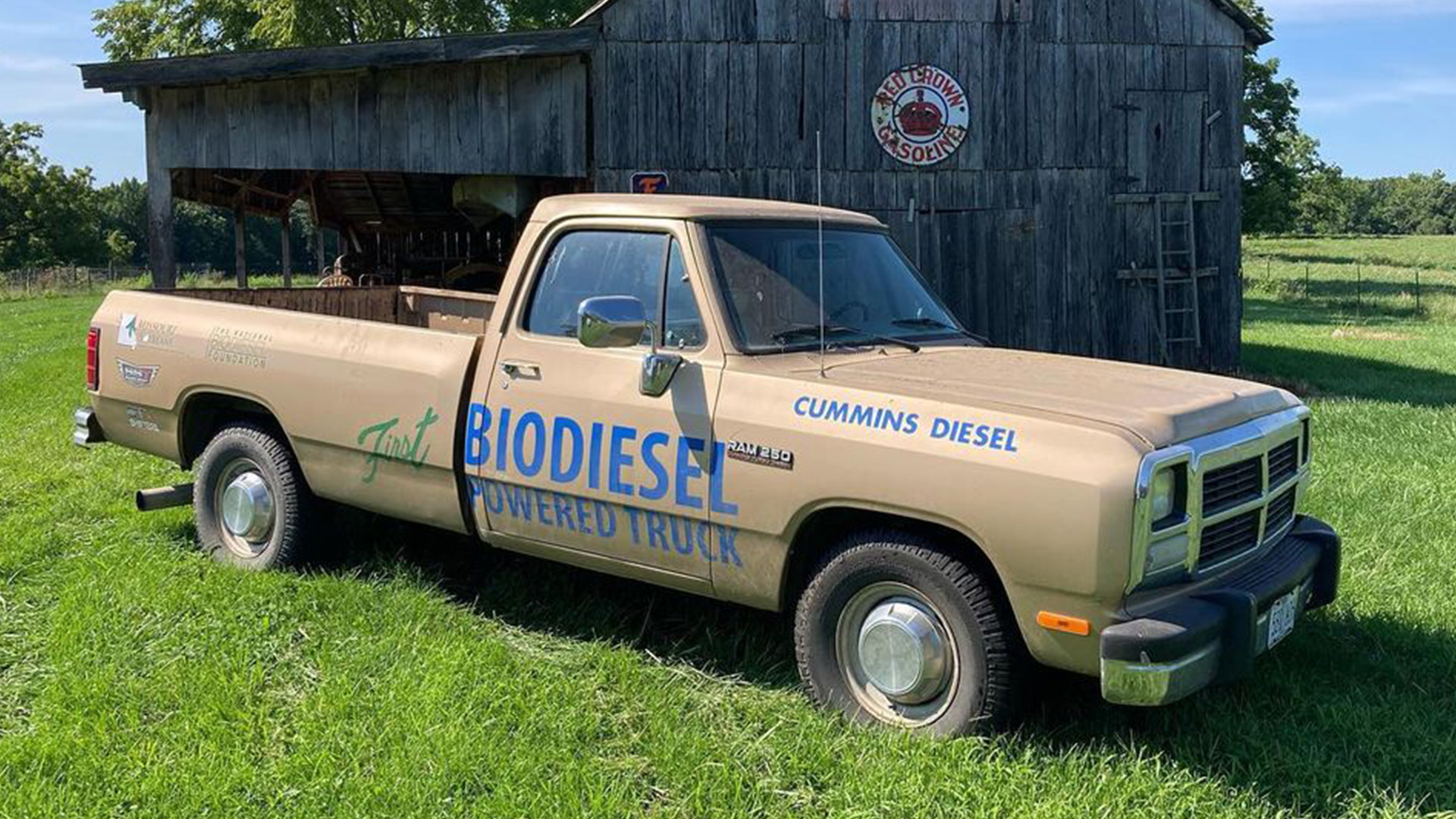

While seeking out experts for my ridiculously in-depth feature on biodiesel, I crossed paths with Don Scott. He’s an engineer who’s been around the scene since the beginning, and during our phone conversation, he let slip an interesting piece of info: He stewards the world’s first truck to run on biodiesel. It’s a 1991 Dodge Ram 250 with a 12-valve Cummins and a stellar story to tell.
Scott attended the University of Missouri in the early ’90s when researchers there first began experimenting with biodiesel made from soybean oil. You can read that whole tale in my biodiesel explainer, but what’s important to know is that farmers needed a development mule. Scott retells it this way:
“In 1991, when the farmers paid the university to do the research, the farmers were not quite confident. They’re like, ‘Well, we’ll pay you to do the research, but we don’t have enough money to buy a pickup truck or an engine.’ Leon Schumacher, who led the work at the university, he made a deal with the Foundation Seed, which is basically like a farm within the university. The university’s farm. They’re like, ‘This farm needs trucks, so if you buy a diesel pickup truck, we can use your work truck for the research.
“That was the gold Dodge.”
Wouldn’t you know it, their hard work paid off and they created the first pickup to run on biodiesel. The researchers were ready to take it touring so they could shout from the rooftops about what they’d done, but there was a problem, as Scott recounts. “The university farm said, ‘Well, you can’t. That’s our work truck. We need that truck to do work.'”
So they bought another truck, a silver-and-white Dodge. It became the biodiesel poster child for a while, and after that, the Missouri Soybean Association bought a 7.3-liter Power Stroke Ford that they took to the national stage in Washington DC. All the while, the gold first-gen Cummins was doing chores back at Mizzou.
The farm continued driving it until 2006 when its transmission went out. They parked it that day and it stayed put for 13 years until Scott talked with Leon Schumacher, who asked him to give a sustainability presentation at the university in 2019. Scott was working alongside Cummins on its R2.8 crate engine at the time and while they were discussing it, that old 12-valve was brought up.
“The truck is still around and the university farm is going to pull the motor out. They’re going to put it in a bigger truck,” Scott remembered Schumacher saying.
“That would be a shame, historically speaking, I want to be able to say that the first truck to run a biodiesel is still going strong,” Scott said. “He agreed with me.”
The university farm marked the truck as surplus and sold it to Scott who immediately donated it to the National Biodiesel Board. They repaired it by installing a Tremec TR-4050 five-speed manual, marking another first as no other B-Series Cummins had ever been mated to that transmission. It was back on the road after more than a decade and the biodiesel crew had big aspirations for it.

Scott and Co. drove the first-gen to Cummins’ centennial anniversary event in 2019. It was a key part of the National Biodiesel Board’s pitch to become the official fuel for the manufacturer’s next 100 years. It was well-positioned to make that proposal, but ultimately, Cummins was lukewarm on the idea. It’s spent big on developing fuel-agnostic engines in recent years which, of course, can run on biodiesel but also hydrogen if that ends up being the way forward.
“When the project wrapped up, I bought it back again, so I bought that truck twice,” Scott said. “Just a modest old pickup truck that actually changed the world in a little bit of a way.”


Rest assured, it’s still working as intended. Whether it’s pulling an enclosed trailer or another one of Scott’s biodiesel-powered Cummins pickups, the golden show pony is alive and well.
Got a tip or question for the author? Contact them directly: caleb@thedrive.com